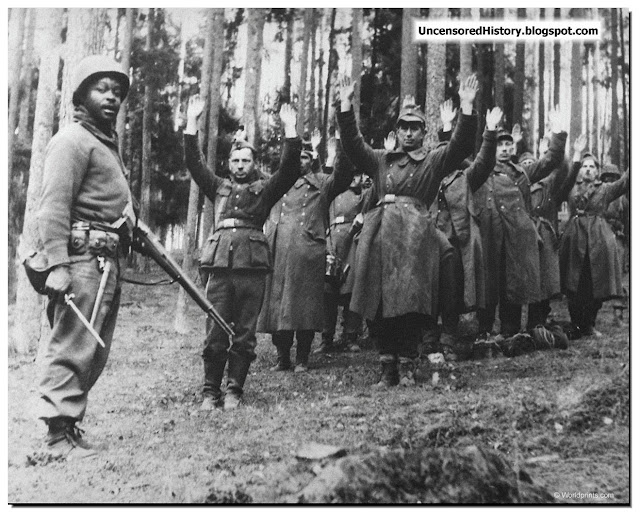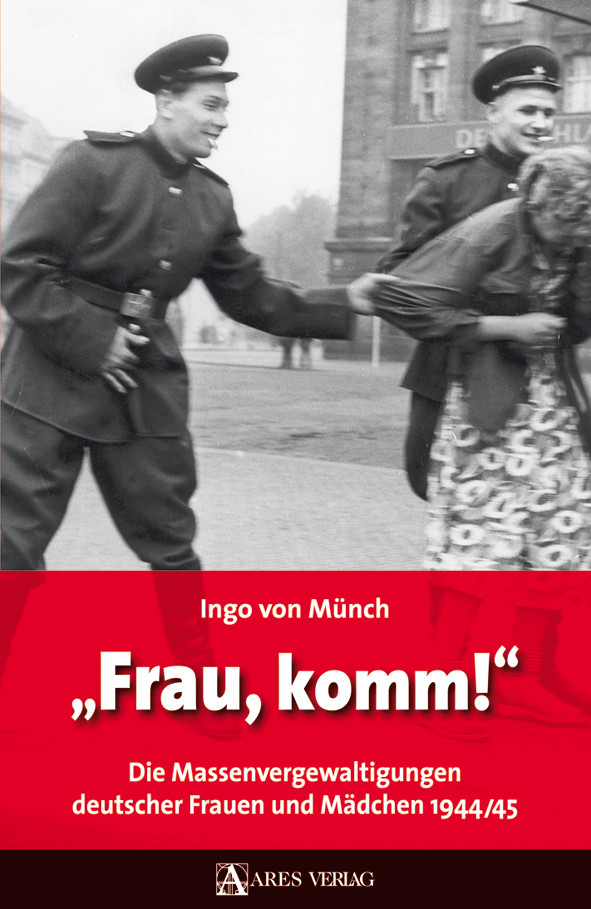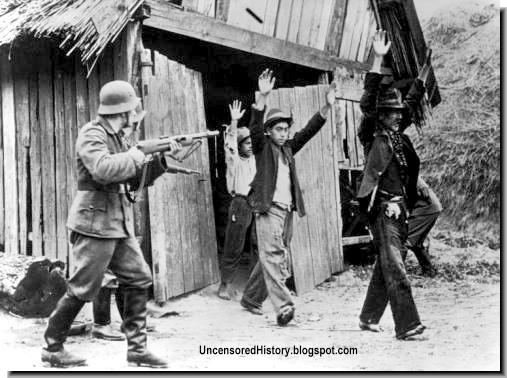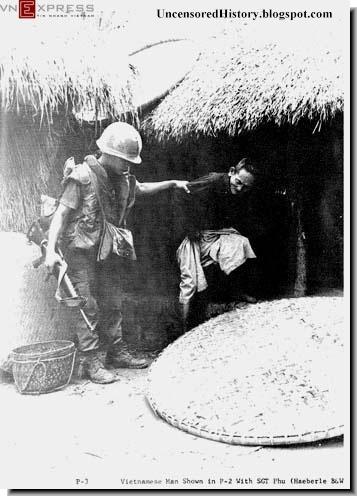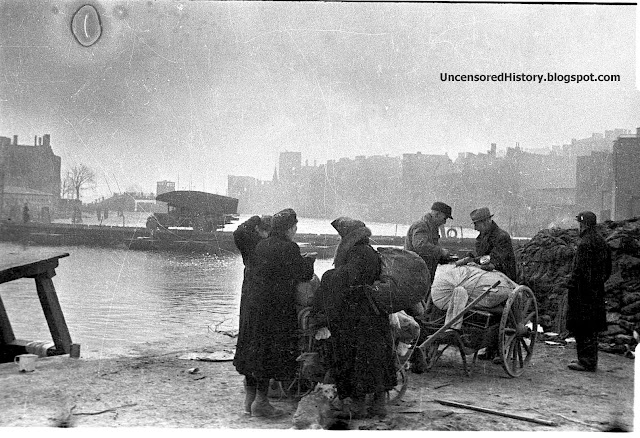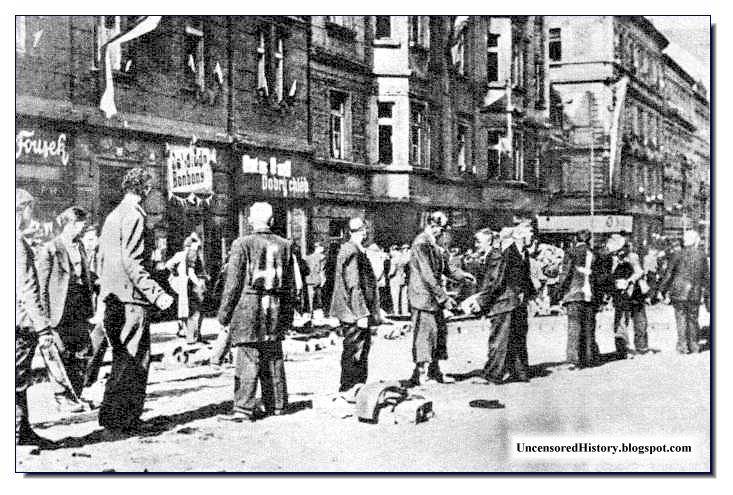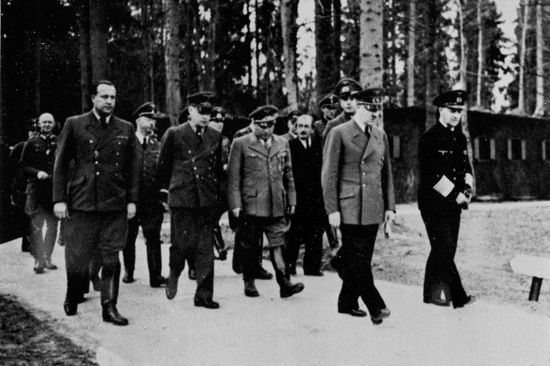Below is an extract from William Shirer's Rise and Fall of the Third Reich which shows how Hitler went about to get Anschluss, the 'Union with Austria'.
It was a bully at work.
Dr. Kurt von Schuschnigg, the Austrian Chancellor,
would later recall the period between February 12 and March 11 as "The Four Weeks' Agony."
Throughout 1937, the Austrian Nazis, financed and egged on by Berlin, had stepped up their campaign of terror. Bombings took place nearly every day in some part of the country, and in the mountain provinces massive and often violent Nazi demonstrations weakened the government's position. Plans were uncovered disclosing that Nazi thugs were preparing to bump off Schuschnigg as they had his predecessor. Finally on January 25, 1938, Austrian police raided the Vienna headquarters of a group called the Committee of Seven, which had been set up to bring about peace between the Nazis and the Austrian government, but which in reality served as the central office of the illegal Nazi underground. There they found documents initialed by Rudolf Hess, the Fuehrer's deputy, which made it clear that the Austrian Nazis were to stage an open revolt in the spring of 1938 and that when Schuschnigg attempted to put it down, the German Army would enter Austria to prevent "German blood from being shed by Germans."
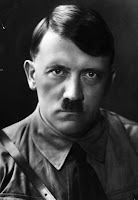 |
| THE BULLY..... |
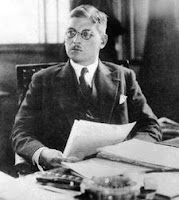 |
| ...AND THE BULLIED |
Kurt von Schuschnigg, forty-one years old, was, as all who have known him would agree, a man of impeccable Old World Austrian manners, and it was not unnatural for him to begin the conversation with a graceful tidbit about the magnificent view, the fine weather that day, and a flattering word about this room having been, no doubt, the scene of many decisive conferences. Adolf Hitler cut him short: "We did not gather here to speak of the fine view or of the weather." Then the storm broke. As the Austrian Chancellor later testified, the ensuing two-hour "conversation was somewhat unilateral."·
You have done everything to avoid a friendly policy [Hitler fumed] The whole history of Austria is just one uninterrupted act of high treason. That was so in the past and is no better today. This historical paradox must now reach its long-overdue end. And I can tell you right now, Herr Schuschnigg, that I am absolutely determined to make an end of all this. The German Reich is one of the great powers, and nobody will raise his voice if it settles its border problems.
Shocked at Hitler's outburst, the quiet-mannered Austrian Chancellor tried to remain conciliatory and yet stand his ground. He said he differed from his host on the question of Austria's role in German history. "Austria's contribution in this respect," he maintained, "is considerable."
HITLER: Absolutely zero. I am telling you, absolutely zero. Every national idea was sabotaged by Austria throughout history; and indeed all this sabotage was the chief activity of the Hapsburgs and the Catholic Church.
SCHUSCHNIGG:All the same, Herr Reichskanzler, many an Austrian contri· bution cannot possibly be separated from the general picture of German cul· ture. Take for instance a man like Beethoven ...
HITLER: Oh-Beethoven? Let me tell you that Beethoven came from the lower Rhineland.
SCHUSCHNIGG:Yet Austria was the country of his choice, as it was for so many others ...
HITLER: That's as may be. I am telling you once more that things cannot go on in this way. I have a historic mission, and this mission I will fulfill be· cause Providence has destined me to do so ... who is not with me will be crushed ... Ihave chosen the most difficult road that any German ever took; I have made the greatest achievement in the history of Germany, greater than any other German. And not by force, mind you. I am carried along by the love of my people ...
SCHUSCHNIGG:Herr Reichskanzler, I am quite willing to believe that.
After an hour of this, Schuschnigg asked his antagonist to enumerate his complaints. "We wiIl do everything," he said, "to remove obstacles to a better understanding, as far as it is possible."
HITLER:That is what you say, Herr Schuschnigg. But I am telling you that I am going to solve the so-called Austrian problem one way or the other.
He then launched into a tirade against Austria for fortifying its border against Germany, a charge that Schuschnigg denied.
HITLER:Listen, you don't really think you can move a single stone in Austria without my hearing about it the next day, do you? ... I have only to give an order, and in one single night all your ridiculous defense mechanisms will be blown to bits. You don't seriously believe that you can stop me for half an hour, do you? ... I would very much like to save Austria from such a fate, because such an action would mean blood. After the Army, my S.A. and Austrian Legion would move in, and nobody can stop their just revenge-not even I.
After these threats, Hitler reminded Schuschnigg (rudely addressing him always by his name instead of by his title, as diplomatic courtesy called for) of Austria's isolation and consequent helplessness.
HITLER:Don't think for one moment that anybody on earth is going to thwart my decisions. Italy? I see eye to eye with Mussolini ... England? England will not move one finger for Austria ... And France? France, he said, could have stopped Germany in the Rhineland "and then we would have had to retreat. But now it is too late for France."
Finally: HITLER: I give you once more, and for the last time, the opportunity to come to terms, Herr Schuschnigg. Either we find a solution now or else events will take their course ... Think it over, Herr Schuschnigg, think it over well. I can only wait until this afternoon ...
Schuschnigg says he felt relieved to have at least something definite from Hitler. But as he perused the document his relief evaporated. For here was a German ultimatum calling on him, in effect, to turn the Austrian government over to the Nazis within one week.
The ban against the Austrian Nazi Party was to be lifted, all Nazis in jail were to be amnestied and the pro-Nazi Viennese lawyer Dr. Seyss- Inquart was to be made Minister of the Interior, with authority over the police and security. Another pro-Nazi, Glaise-Horstenau, was to be appointed Minister of War, and the Austrian and German armies were to establish closer relations by a number of measures, including the systematic exchange of one hundred officers.
"Preparations will be made," the final demand read, "for the assimilation of the Austrian into the German economic system. For this purpose Dr. Fischboeck [a pro-Nazi] will be appointed Minister of Finance."
Schuschnigg, as he later wrote, realized at once that to accept the ultimatum would mean the end of Austria's independence.
HITLER: Herr Schuschnigg ... here is the draft of the document. There is nothing to be discussed. I will not change one single iota. You will either sign it as it is and fulfill my demands within three days, or I will order the march into Austria.
Schuschnigg capitulated. He told Hitler he was willing to sign. But he reminded him that under the Austrian constitution only the President of the Republic had the legal power to accept such an agreement and carry it out. Therefore, while he was willing to appeal to the President to accept it, he could give no guarantee.
"You have to guarantee it!" Hitler shouted. "I could not possibly, Herr Reichskanzler," Schuschnigg says he . .:- plied.
At this answer [Schuschnigg later recounted] Hitler seemed to lose his selfcontrol. He ran to the doors, opened them, and shouted, "General Keitel!" Then turning back to me, he said, "I shall have you called later."
This was pure bluff, but the harassed Austrian Chancellor, who had been made aware of the presence of the generals all day, did not perhaps know it.
Papen relates that Keitel told later of how Hitler greeted him with a broad grin when he rushed in and asked for orders. "There are no orders," Hitler chuckled. "I just wanted to have you here."
But Schuschnigg and Dr. Schmidt, waiting outside the Fuehrer's study, were impressed. Schmidt whispered that he would not be surprised if the both of them were arrested within the next five minutes.
Thirty minutes later Schuschnigg was again ushered into the presence of Hitler. I have decided to change my mind-for the first time in my life [Hitler said]. But I warn you this is your very last chance. I have given you three additional days to carry out the agreement.12 That was the extent of the German dictator's concessions, and though the wording of the final draft was somewhat softened, the changes, as Schuschnigg later testified, were inconsequential.
Schuschnigg signed. It was Austria's death warrant.
























